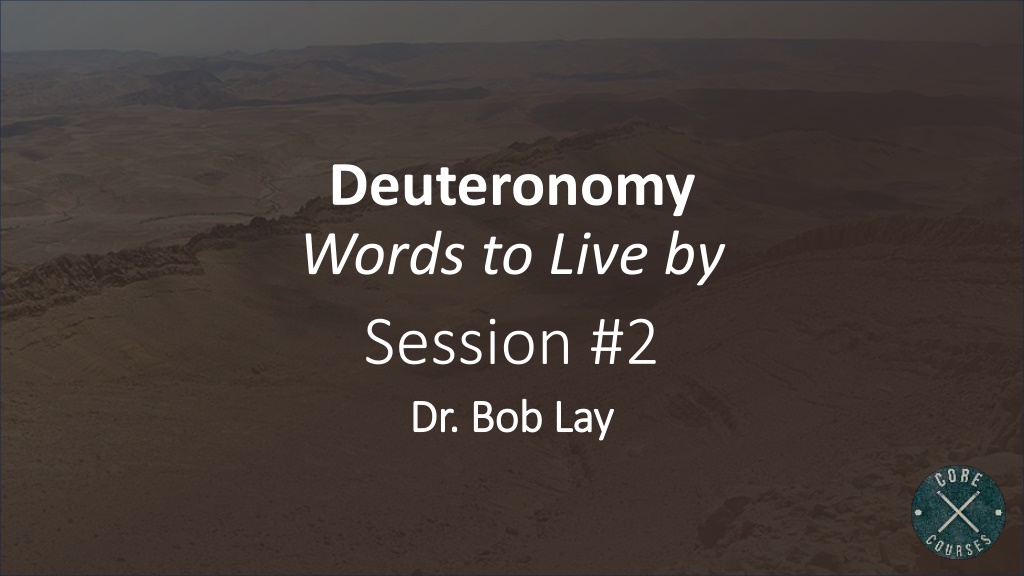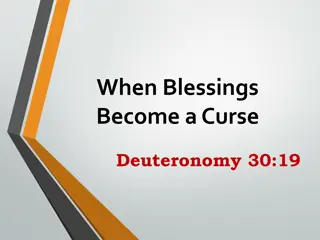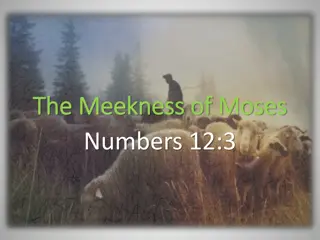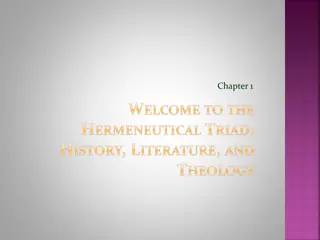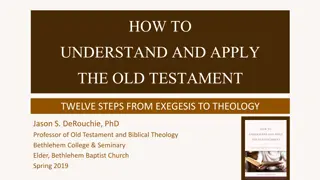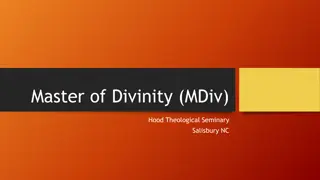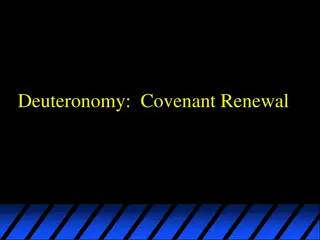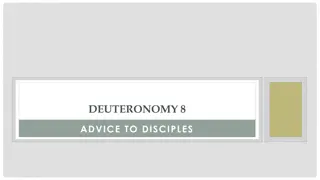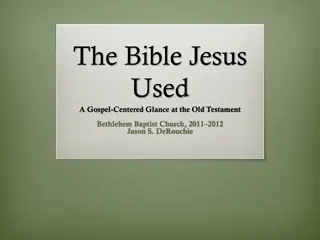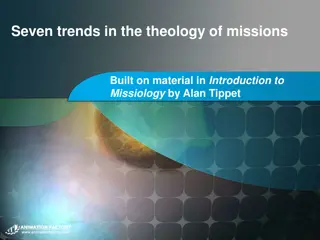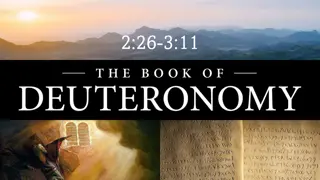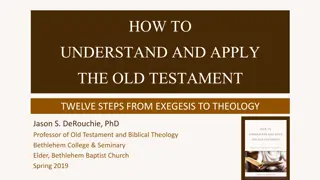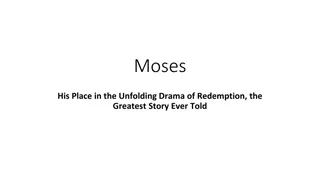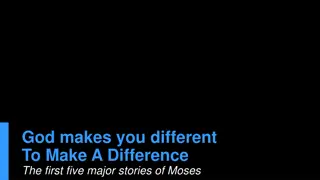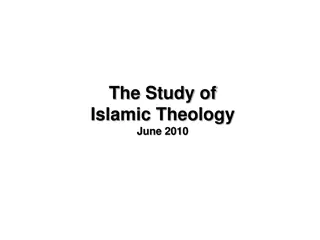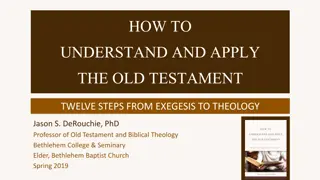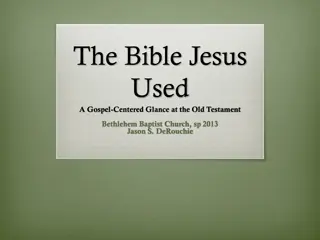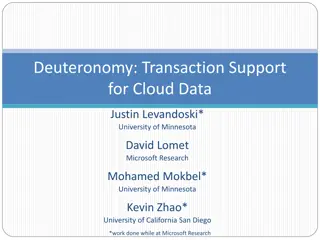Understanding Deuteronomy: Moses' Teachings and Biblical Theology
Delve into the profound teachings of Moses as he imparts the importance of obedience and renewal to Israel in the book of Deuteronomy. Explore how this foundational text contributes to the canon of Scripture and influences later historical, prophetic, and poetic writings, along with the teachings of Jesus and the Apostles.
Download Presentation

Please find below an Image/Link to download the presentation.
The content on the website is provided AS IS for your information and personal use only. It may not be sold, licensed, or shared on other websites without obtaining consent from the author. Download presentation by click this link. If you encounter any issues during the download, it is possible that the publisher has removed the file from their server.
E N D
Presentation Transcript
Deuteronomy Words to Live by Session #2 Dr. Bob Lay Dr. Bob Lay
For it is no empty word for you, but your very life, and by this word you shall live long in the land that you are going over the Jordan to possess. Deuteronomy 32:47 ESV
Six Guide Questions WHO? WHAT? WHERE? WHEN? WHY? HOW?
Study #1 Who is Moses? Study #1 Who is Moses? Study #2: What is Biblical Theology?
Biblical Theology asks: Biblical Theology asks: What does Deuteronomy contribute to the canon of Scripture? How does it guide and shape the later historical, prophetic, and poetical writings, as well as the teachings of Jesus and the Apostles?
Deuteronomys Twofold Pattern: The final book of Moses crystallizes the themes and messages of the first four books of the Bible, while at the same time it establishes the theological foundation for the books of history and prophesy to follow.
Moses Teaches Israel to Obey: Moses reiterates and explains the law on the eve of the conquest. He invites Israel to renew it s commitment (i.e., covenant) to the Lord in the present circumstances.
Moses explains the Torah Beyond the Jordan, in the land of Moab, Moses undertook to explain this law (torah), saying, (1:5) Now this is the commandment (mitzvah) the statutes (chukim) and the rules (mishpatim) that the LORD your God commanded me to teach you, that you may do them in the land to which you are going over, to possess it, (6:1)
Moses Teaches Israel to Obey: He recallsIsrael s disobedient wanderings (chs. 1-3) He exhorts Israel to obey Torah & avoid idolatry (ch.4) He expounds the meaning & intent of the Law in the context of the Ten Words (ch.5-6), Israel s true identity (ch.7), and God s faithfulness despite Israel s faithlessness (chs.8-11)
Exodus & Numbers Citations in Deuteronomy Deuteronomy 1:9-18 1:19-45 Ex.18:13-27; Num. 11:10-30 appointing judges Numbers 13-14 Kadesh rebellion Law citations 5:6-21 In these (and many additional) citations, Moses applies the law to the Israelites current circumstances. Ex.20:1-17 Ten Commandments
The Book of Deuteronomy Deuteronomy establishes the theological foundation for the books of history and prophesy to follow.
Deuteronomy is foundational for OT Historical Books Deuteronomy OT Citations 5:32 Joshua 1:5-9 Obey, don t turn aside 12:8 Judges 17:6 To be right in one s own eyes 12:16 2 Samuel 23:16-17 Blood = life 17:17 1 Samuel 8:5 A king like the nations 1 Kings 11:2-4 Turning Solomon s heart 20:1-20 Joshua s conquest of Canaan 32:39 1 Samuel 2:6 The Lord s sovereignty
Deuteronomy is foundational for OT Prophets Deuteronomy 6:16 6:16 7:9 7:9 8:12 8:12- -14 12:2 12:2 15:1,12 15:1,12 24:1 24:1 29:1 29:1 Isaiah 7:12 Do not test the Lord Isaiah 7:12 Do not test the Lord Daniel 9:4 The Lord s covenant faithfulness Daniel 9:4 The Lord s covenant faithfulness Hosea 13:6 Satisfied, proud, forget Hosea 13:6 Satisfied, proud, forget Hosea 4:13 Sacrifices on every hill Hosea 4:13 Sacrifices on every hill Jeremiah 34:14 Releasing slaves Jeremiah 34:14 Releasing slaves Malachi 2:16 Divorce and remarriage Malachi 2:16 Divorce and remarriage Jeremiah 31:31 Jeremiah 31:31- -34 The New Covenant 34 The New Covenant Prophetic passages 14
Deuteronomy foundational in Psalms & Proverbs Ps 1:1 Walk, sit, stand Ps 81:9-10 Have no other gods Ps 106:24-26 Rebellion in the wilderness Ps 106:32 The sin of Moses Ps 135:10-11 Smiting Sihon & Og Ps 136:12 Mighty hand and outstretched arm Prov 3:1-3, 21-24; 9:20-23; 7:1-3: Teaching the next generation
Deuteronomy in the New Testament One of the scribes asked him, which commandment is the most important of all? Jesus answered, The most important is, Hear, O Israel: The Lord our God, the Lord is one. And you shall love the Lord your God with all your heart and with all your soul and with all your mind and with all your strength Mark 12:28-31 (quoting Deuteronomy 6:4-5)
Deuteronomy in the New Testament Read Matthew 4:1-11 (or Luke 4:1-12) Then compare with: Deuteronomy 6:4-16 & Deuteronomy 8:1-3
Deuteronomy in the New Testament Jesus is tempted by Satan in Matthew 4:1-11 (~ Luke 4:1-12) Not by bread alone: Deuteronomy 8:3 Don t test the Lord: Deuteronomy 6:16 Worship the Lord alone: Deuteronomy 6:4,13-14
Session #2 Conclusions The arrival of the people of God to a place and time of reflection and recommitment: what has the Lord done and what will they therefore do? A call to reflect on their identity as God s treasure, as separate from the world, as a people characterized by their love for God, concern and care for others, and radical obedience to Torah.
Sources for Session #2 Arnold, Bill T. The Book of Deuteronomy, Chapters 1-11 (NICOT, 2022) Campbell, A.F. & Mark O Brien. Unfolding the Deuteronomistic History (Fortress, 2000) Hays, Richard B. Echoes of Scripture in the Gospels (Baylor, 2016) Schnittjer, G.E. Old Testament Use of Old Testament (Zondervan, 2021) Wright, Christopher J.H. Salvation Belongs to Our God: Celebrating the Bible s Central Story (IV Academic, 2007)
Where do we go from here? Study #3, February 7: How is the Sinai Covenant related to other covenants?
